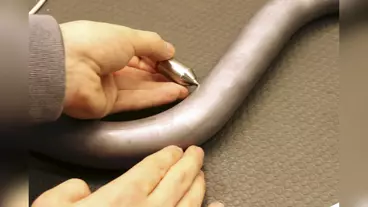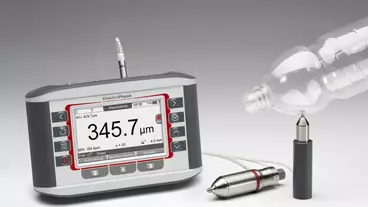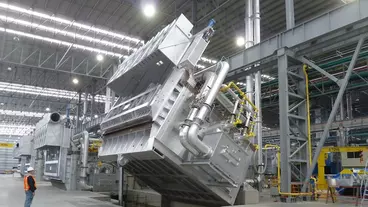Reducing material consumption and increasing product quality
MiniTest FH from Elektrophysik reveals its strengths when it comes to measuring the wall thickness of aluminium foils, sheets or tubes.

Due to high raw material prices and energy-intensive aluminium production processes, cost control is of crucial importance for the manufacturing industry. Even minor fluctuations in wall thickness and material thickness have a direct impact on material costs.
Consistent material strength is also a decisive quality factor for the processing industry, which manufactures precision parts made of aluminium or aluminium alloys for the automotive or aircraft industry, in plant engineering for the chemical or pharmaceutical sector. Therefore, aluminium processing companies need non-destructive, mobile, easy-to-use measuring methods to be able to carry out wall thickness measurements throughout the entire value-added process in order to minimize rejects and thus costs and prevent collateral damage in the further production process.
Solid measuring equipment for a wide range of measuring tasks
Using the MiniTest FH from Elektrophysik, such measurements can be easily carried out at any time. The gauge delivers exact results on the wall thickness of sheets, foils, profiles or pipes. The ergonomic shape of the wall thickness gauge, its straightforward handling and the fact that it can be used on the go make it the ideal tool in production. The compact measuring device consists of a control and display unit and a sensor connected via cable, which is available in a wide selection of different versions – depending on the specific measuring task. The measuring range of 0-24 mm is extremely flexible.
Seamless integration in automated processes
MiniTest FH can be seamlessly integrated into automated processes, for example at Heinrichs Messtechnik GmbH, a German manufacturer of flow measurement technology, where highest precision is required for the aluminium pipe material to be processed during production. A key quality feature of the end products is to have as little variation as possible in the wall thickness of the measuring loops that are bent from the tubes to be tested.
“So far, we have only had the opportunity to evaluate the pipe in its complete form,” says Bert Snüverink, head of Quality Management at Heinrichs Messtechnik GmbH. “For this purpose, the outer diameter was measured at several points and at the ends. Wall thickness measurement using callipers was used as the test method. In addition, the total length and weight were determined. If different weights were identified despite the same length, a fluctuation in the wall thickness had to be assumed and the aluminium pipe as a whole had to be assessed as not in compliance, even if the deviation was possibly only at the end of the pipe and this could potentially have been reused after shortening.”
MiniTest FH offers a lot more flexibility. As the gauge features a continuous measuring mode that allows to scan the material surface with the sensor. Both the actual readings and the minimum and maximum values as well as the average value are displayed. “Incoming goods inspection is the first step where we make use of the MiniTest gauge. This is a great advantage, as unsuitable material can be sorted out before production and there is no need to worry about any impact on further value-adding processes,” explains Snüverink.

Thickness measurement of foils, sheets and alloys
In contrast to wall thickness measurement with ultrasonic instruments, the MiniTest FH can also measure the material thickness of thin aluminium foil precisely. While the measuring range of ultrasonic devices only starts at 1 mm wall thickness and an accuracy of 15 µm can be achieved for aluminium alloys after calibration, the MiniTest FH already measures with a precision of ±10 µm + 3% of reading in the factory setting and achieves a precision of ±3 µm + 1% of reading after calibration.
The MiniTest FH can also be the perfect tool to measure the thickness of aluminium foils used in the packaging sector for food, cosmetics or pharmaceuticals, as well as foil for insulation purposes in the construction industry. Alloys with other metals such as magnesium, manganese, copper, silicon or zinc also have no influence on the measurement.
For aluminium profiles, the wall thickness can be determined with the MiniTest FH by inserting steel balls with a relatively small diameter, even in places that are difficult or impossible to access with conventional callipers. This means that the MiniTest FH can measure the material thickness during the rolling process and help to maintain the tolerances for the thickness specifications and, in the event of deviations, correct them in the pre-control stage.
Straightforward calibration, operation and data processing
The measuring instrument is equipped with a 4.3-inch colour display with a resolution of 800 x 480 pixels. All sensors that can be connected work according to the SIDSP method (sensor-integrated digital signal processing). The AI-based quick calibration can perform a zero calibration for any sensor and any ball diameter in less than ten seconds at the touch of a button. Various interfaces enable fast data transfer and further processing of the measurement results.

With the new Minitest FH, Elektrophysik offers a very compact device for a wide variety of measuring tasks.

Radar-based width measuring at the roughing stand leads to a more stable rolling process despite the harsh conditions with high occurrence of splashing water, steam and scale.

New melting and casting complex in U.S. will use electromagnetic stirrers by ABB and is set to become a beacon for reshoring, recycling and sustainable practices.

